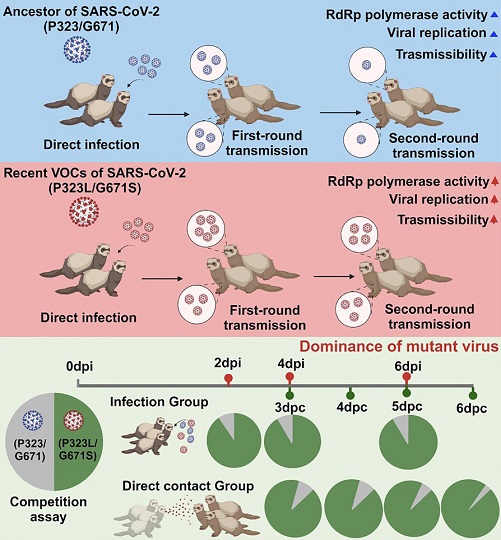South Korean Ferret Study Finds SARS-CoV-2 NSP12 P323L And G671S Mutations Causes Enhanced Transmissibility And Virus Replication In Upper Airway!
Nikhil Prasad Fact checked by:Thailand Medical News Team Sep 07, 2023 1 year, 7 months, 1 week, 6 days, 11 hours, 51 minutes ago
COVID-19 News: In the ongoing battle against the COVID-19 pandemic, scientists worldwide are racing to understand the genetic mutations that drive the evolution of the SARS-CoV-2 virus. A crucial aspect of this research is assessing the impact of these mutations on the virus's ability to replicate and spread. A new study conducted by researchers from the Korea Virus Research Institute, Institute for Basic Science (IBS), Chungbuk National University, Korea Research Institute of Bioscience and Biotechnology (KRIBB), and the Cleveland Clinic in the United States has uncovered significant insights into how specific mutations in the SARS-CoV-2 virus enhance its transmissibility and replication in the upper respiratory tract.
 Graphical Abstract
Graphical Abstract
The study's findings shed light on the role of two mutations in the NSP12 protein, namely P323L and G671S, in altering the polymerase kinetics of the virus in a temperature-dependent manner. These mutations were found to increase the interaction between NSP12 and NSP8, which reinforces the assembly of the viral replication machinery. Consequently, SARS-CoV-2 variants carrying these mutations exhibited higher viral titers in the upper airways, ultimately enhancing their transmissibility.
Understanding the Dynamics of SARS-CoV-2 Mutations
The SARS-CoV-2 virus, responsible for the COVID-19 pandemic, is an RNA virus known for its rapid mutation rate. While many of these mutations may not significantly impact the virus's behavior, some can lead to the emergence of new variants with altered characteristics. One of the most well-known mutations is the D614G mutation in the spike (S) protein, which has been associated with increased infectivity and transmissibility as covered in previous studies and
COVID-19 News reports.
In addition to the spike protein mutations, the P323L mutation in the NSP12 protein, which encodes the viral RNA-dependent RNA polymerase (RdRp), has garnered attention. RdRp is a critical component of the virus's replication machinery, making it a target for understanding how the virus replicates and spreads.
The SARS-CoV-2 virus initially exhibited relatively stable genetics, but as it continued to spread through the human population, mutations became more frequent. Some of these mutations, like P323L, have been linked to selective advantages, driving their emergence and persistence in certain variants of the virus.
Comprehensive Assessment of SARS-CoV-2 Variants
As various SARS-CoV-2 variants emerged globally, researchers recognized the need for a comprehensive evaluation of their characteristics, including their replicative fitness and transmissibility. To address this, the study aimed to compare different variants of the virus in terms of their replication kinetics, transmi
ssibility, and the impact of mutations in the NSP12 RdRp.
The Role of Temperature in Viral Replication
One crucial discovery made in this study is the significant influence of temperature on SARS-CoV-2 replication. The upper respiratory tract, where the virus often establishes infection, typically has a lower temperature (around 33°C) than the lower respiratory tract (around 37°C). The study found that mutations in NSP12, particularly P323L and P323L/G671S, led to enhanced RdRp activity at the lower temperature (33°C). This enhanced activity correlated with increased viral replication in the upper respiratory tract, suggesting that temperature differences play a pivotal role in the virus's behavior.
When ferrets were directly infected with mutant viruses, they exhibited significantly higher viral titers in nasal washes compared to wild-type viruses. This rapid replication in the upper respiratory tract led to enhanced transmissibility to naive ferrets. The mutations were found to have a more substantial impact in the upper respiratory tract (33°C) compared to the lower respiratory tract (37°C). This temperature-dependent effect mirrors the behavior of other RNA viruses in response to temperature changes.
Mechanisms Behind Enhanced Replication
To delve deeper into the mechanisms responsible for the enhanced replication observed in NSP12 mutants, the researchers conducted structural and molecular dynamics simulations. These analyses revealed that the P323L and P323L/G671S mutations strengthen the interaction between NSP12 and NSP8 through hydrophobic effects. This reinforcement results in improved assembly of the viral replication machinery, enhancing RdRp activity. Moreover, experimental assays verified this enhanced interaction, supporting the hypothesis that NSP12 mutations promote efficient viral replication.
The Competitive Advantage of Mutations
One of the most intriguing findings of the study was the competitive advantage conferred by NSP12 mutations. In competitive transmissibility experiments, NSP12 mutants outperformed wild-type viruses in terms of replicative fitness and transmission efficiency. These results highlight the pivotal role of NSP12 mutations, particularly P323L and P323L/G671S, in driving the rapid spread of SARS-CoV-2 variants in human populations.
Implications for Omicron Variants
The study also shed light on the prevalence of NSP12 mutations, particularly P323L, in the Omicron variants. Variants like BA.1 to BA.5 commonly carry the NSP12 P323L mutation, while BA.2.75 and XBB Omicron variants often have the NSP12 P323L/G671S mutations. These mutations likely contribute to the high transmissibility of Omicron variants. Therefore, NSP12 mutations have a significant impact on viral replication and transmission, shaping the trajectory of the pandemic.
Conclusion
The South Korean ferret study has provided valuable insights into the mechanisms by which NSP12 mutations, particularly P323L and P323L/G671S, enhance the transmissibility and replication of SARS-CoV-2 in the upper respiratory tract. The findings underscore the importance of understanding the genetic basis of viral mutations and their impact on viral behavior. This knowledge is crucial for developing effective countermeasures and predicting the emergence and dominance of new variants in the ongoing battle against the COVID-19 pandemic
The study findings were published in the peer reviewed journal: Cell Reports.
https://www.cell.com/cell-reports/fulltext/S2211-1247(23)01088-4
For the latest
COVID-19 News, keep on logging to Thailand Medical News.
